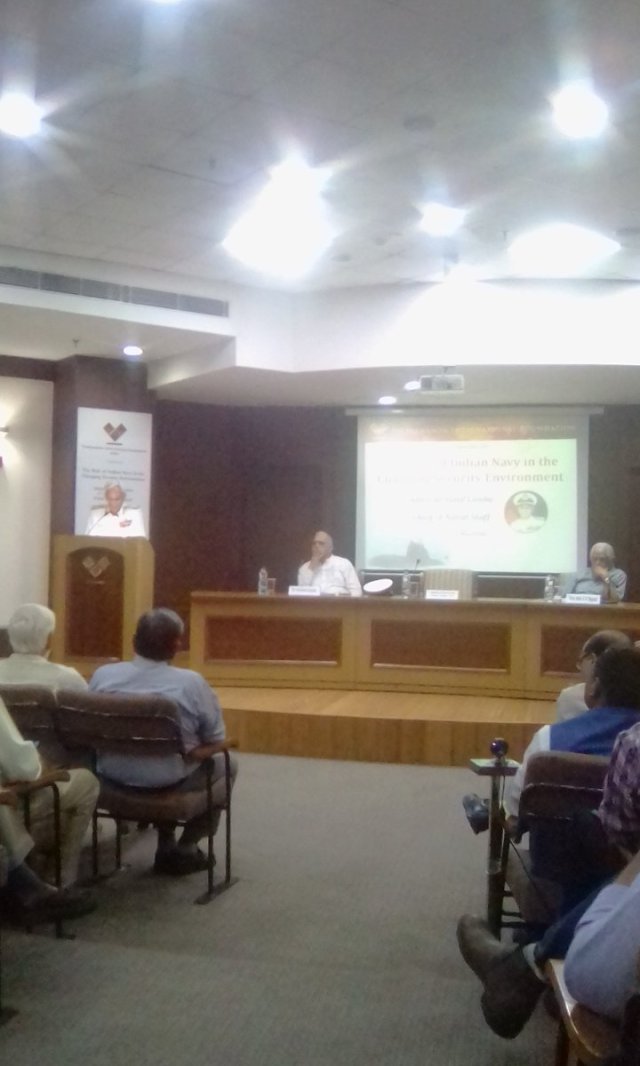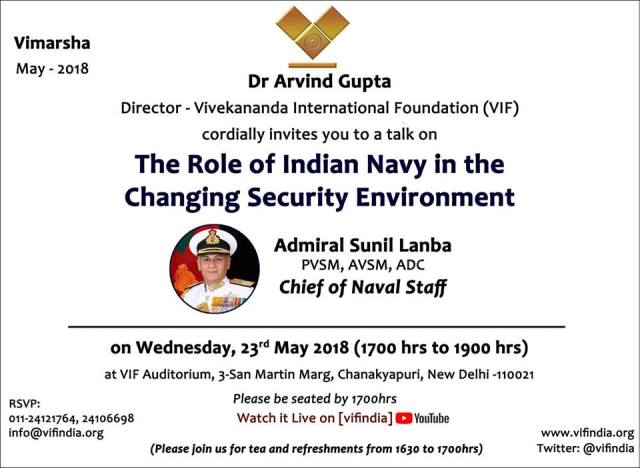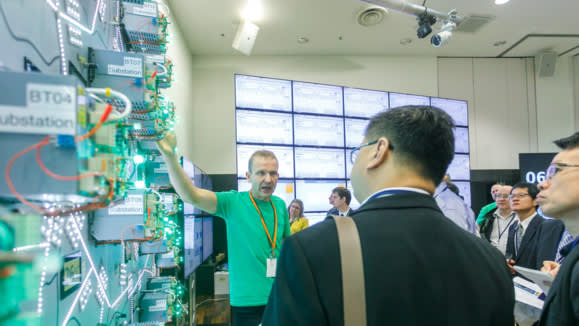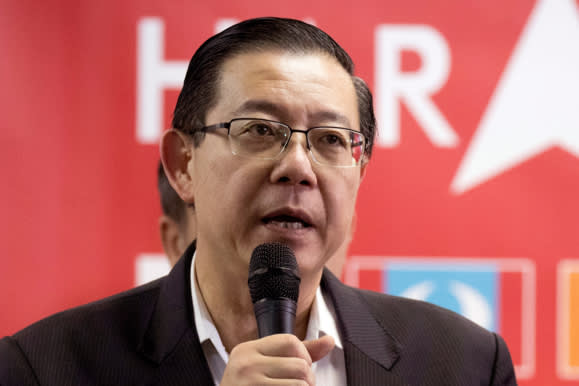The Role of Indian Navy in the Changing Security Environment
Sagar Media Inc: Maritime policy Maritime deterrence is important strategy features in Maritime its application and coordinate other force activities on sea encompasses all of Navy and other forces. Admiral Sunil Lanba gave vivid description of Navy history from Chola dynasty playing an important role and thereafter Maratha too with significant presence but later with the art of Maritime rested with Europeans and thus colonial era began.

His address dwell on the global dynamic with global security strategy was the center of his elaborate address with Indian advancement in strides after rapid growth of Chinese influence in the area of maritime from 2008 onward, Indian government from 2012 onward moved with baby steps has taken bold initiative since 2015.
With the address and his tone about the national security with latest maritime weaponry, surveillance and coordination with many maritime neighbor nations and our exercises, training foreign navy personals along with a bird view on trades, piracy, illegal drugs trades, oil drilling and fishing are some of the challenges each day coastguards with along with navy face, make an excellent efforts to keep watch and execute national maritime plan for coastal belt of our nation is a commendable efforts.
Further more he said, thousand vessels with navy training on various wings department is in fast pace of rapid technology transfer. Navy is also moving with Fighter carriers and submarines indigenous designed and manufactured with radars and missile launchers ability along with surveillance of Indian oceans. The coordination of Indian navy on various counts with neighbor nations to best of its ability is the pride of navy well explained by Admiral Sunil Lanba in best diction.

Further more, the question- answer session of about more than an hours, a spell bound experience in the august gathering of three service persons present, the researchers, the students and media in full glare enjoyed each bit of knowledge so condensed in two hours about Indian Navy from the chief Perspective.
Asia-Pacific,NATO allies combat Cyberattacks
NATO drills in late April, the nation of “Crimsonia” launched thousands of cyberattacks on the vital infrastructure of “Berylia.” And for the first time, Australia took a front-row seat as an official observer — part of a new push by Asia-Pacific countries to fortify their defenses against state-backed hackers.

Japan and Australia became members of NATO’s cyberdefense hub earlier this year. Singapore, meanwhile, is leading the Association of Southeast Asian Nations’ drive to deepen cybersecurity ties with the U.K. and Commonwealth countries. It is no secret the potential adversaries are states like Russia, China and North Korea.
The trio leads the world in state-sponsored cybercrime, according to a recent study by the Center for Strategic and International Studies in Washington and U.S. computer security company McAfee.
The latest drills, code-named Locked Shields 2018, were conducted on April 23-27 at NATO’s Cooperative Cyber Defense Center of Excellence in Tallinn, Estonia. Crimsonia carried out over 2,500 attacks on 4,000 pieces of Berylian infrastructure, including telecommunications systems, power plants and military bases.
Berylia’s buildings and IT networks were shown on computer displays, with miniature infrastructure flashing red as the attackers struck. More than 1,000 experts from 30 countries competed to display their defensive capabilities, testing their political, military and civil decision-making skills.
The drills, billed as the world’s largest and most advanced international live-fire cyberdefense exercises, have been held each year since 2010. Australian Foreign Minister Julie Bishop, in an April 23 news release, explained her country’s decision to get involved. “Now, more than ever, we must engage with the international community to set clear expectations for responsible state behavior in cyberspace.”
Brendan Thomas-Noone, a research fellow with the United States Studies Center at the University of Sydney, said that “the coordinated announcement from the U.S., the U.K. and Australia in April that Russia had conducted a cyberattack last year that infected global infrastructure” also played into Canberra’s decision.
Australian government said up to 400 of the country’s companies were affected by the attack. A more coordinated international response, and joint exercises between NATO and partners like Australia, may blunt the impact of future attacks or deter Russia from launching them, Thomas-Noone said.
Japan, which is enhancing its own cybersecurity standards, joined the NATO cyberdefense center in January when Prime Minister Shinzo Abe visited there, becoming the first Asia-Pacific country to do so. The government wants help from NATO and Western allies as Tokyo prepares to host the 2020 Olympics.
Japan, South Korea and Australia have all worked with NATO, but cyberspace is a relatively new area of cooperation. Experts from South Korea’s National Security Research Institute helped organize the event in Tallinn.
As for the U.K. and Singapore, they are spearheading cyberdefense buildups across the ASEAN bloc and the Commonwealth. They intend to focus on capacity-building, including the training of experts.
At the Commonwealth heads of government meeting in London in April, the pair and 51 other countries agreed to forge what they called the world’s largest cybersecurity pact. The goal is to bolster defenses by 2020, and the U.K. will set aside 15 million pounds ($20 million) for this purpose.
Singapore in late April chaired an ASEAN summit where members released a joint statement on cybersecurity cooperation “in recognition of the growing urgency and sophistication of transboundary cyberthreats.” The inaugural ASEAN-Australia special summit in March produced a similar pledge, and in yet another example of increased cooperation, ASEAN and Japan will open a joint cybersecurity center in Thailand in June.
Singapore also hosted a conference called Cybertech Asia in March to encourage cooperation between the public and private sectors.
As allies team up in cyberspace, questions linger over North Korea. Jun Osawa, a senior research fellow at the Nakasone Yasuhiro Peace Institute in Tokyo, said the North “could still be a threat” online even if relations with the U.S. improve after the expected summit between leader Kim Jong Un and President Donald Trump.
Osawa suggested the sanctions-hit country needs $1 billion a year to maintain the regime, and that the government uses ransomware and other attacks to obtain foreign currency from targeted companies. If negotiations with Washington falter, Osawa said, Pyongyang may step up attacks on the U.S., Japan and South Korea again.
asia.nikkei.com
Malaysia’s latent debt,Indonesia, Philippines bear the brunt
Malaysia’s larger-than-expected national debt and the “insolvency” of its state fund have sparked a broad equities sell-off, highlighting the economic battles awaiting Prime Minister Mahathir Mohamad’s new government.
The benchmark Kuala Lumpur Composite Index was down 4.2% for the week, as of Thursday. While much of Malaysia is still basking in the afterglow of Mahathir’s surprise election triumph, foreign investors are increasingly uneasy about the country’s fiscal health. U.S. Federal Reserve expected to continue raising interest rates.
Finance Minister Lim Guan Eng on Tuesday jolted investors by revealing that the national debt is far higher than figures published by the previous government, topping 1 trillion ringgit ($250 billion). Former Prime Minister Najib Razak’s government had put the official debt figure at 686.8 billion ringgit at the end of 2017.

The gap has prompted speculation that officials under Najib altered records to hide the extent of corruption, possibly involving scandal-hit state fund 1Malaysia Development Berhad. “Certain ‘red’ files were accessible only to certain parties, which impeded officials and auditors from carrying out their responsibilities,” the finance chief told reporters.
The finance minister poured further fuel on the fire on Wednesday, when he said “the directors of 1MDB confirmed that 1MDB was insolvent and unable to repay its debts.”
The new administration also said Najib’s government funneled about 7 billion ringgit into the fund, which was at the heart of a corruption scandal that contributed to Najib’s downfall in this month’s election. The former prime minister had claimed 1MDB was paying its own interest with money saved from streamlining operations, but evidence suggests otherwise.
Mahathir’s government is digging to uncover any and all illicit activity that occurred on the previous leader’s watch. Najib, who denies allegations that he misappropriated money from 1MDB, was questioned on Tuesday and Thursday by the country’s anti-corruption commission. He has not been charged.
Najib, for his part, on Wednesday evening blamed the new government’s approach to disclosing information: “Saying that our debt is now 1 trillion ringgit without giving any details of what you mean will just unsettle the financial markets, alarm the credit rating agencies and [undermine] investors’ confidence in our institutions such as our Bank Negara Malaysia,” he wrote on Facebook.
“There must be a clear distinction between political narrative and facts,” he added.
Yet the debt load and 1MDB’s woes are not the only factors unnerving international investors. During the election campaign, Mahathir’s then-opposition coalition promised to scrap the goods and services tax and revive fuel subsidies. The Finance Ministry has already announced the 6% GST will be abolished on June 1, stirring further concern about a deteriorating fiscal balance.
The government has not yet shown how it will fully offset the expected revenue decline. The GST move “increases the government’s reliance on oil-related revenue and narrows the tax base, straining fiscal strength,” Moody’s Investors Service said in a report on Tuesday. Moody’s estimates the end of the GST will result in revenue losses equivalent to 1.9% of gross domestic product this year.
U.S. continues to normalize its monetary policy, money is slowly but surely leaving emerging markets. Indonesia and the Philippines are bearing the brunt: The rupiah and peso have both fallen around 4.6% against the dollar since the start of the year. Both countries have current-account deficits and are more susceptible to fund outflows.
Indonesian and Philippine central banks both raised their benchmark interest rates earlier this month by 25 basis points — to 4.50% for the former and 3.25% for the latter. Yet the moves have not relieved the pressure.
Perry Warjiyo, a veteran central banker who was sworn in as Bank Indonesia’s new governor on Thursday, immediately faces the daunting task of achieving and maintaining the stability of the rupiah as stipulated in the law that governs the bank. ]
“My short-term priority is to strengthen the rupiah stability measures,” Warjiyo told reporters after his swearing-in ceremony in Jakarta. He added that the central bank needs to strengthen the effectiveness of monetary policy for controlling inflation and keeping exchange rates stable, and that it “plans to be more pre-emptive.”
Turkey is another emerging economy playing currency defense, after the lira lost around 17% of its value against the greenback over the past month. The Turkish central bank on Wednesday raised its late liquidity window lending rate — a key rate at which banks can borrow just before the local market closes — to 16.5% from 13.5% after an emergency monetary policy meeting.
/asia.nikkei.com/
Top 10 Countries with a Great Work-Life Balance
Dear Naresh Kumar Sagar,
On a global scale, expats working full time spend an average of 44.3 hours a week at work: about three in five of them are satisfied with their work-life balance (60%) as well as their working hours (61%). Interestingly, it seems like it is not only the number of hours spent at work that lead to a high satisfaction with work-life balance, as the latest Expat Insider survey reveals. Based on the insights of close to 13,000 expats from 188 countries and territories in the annual survey, InterNations, the world’s largest network for people who live and work abroad, compiled a ranking of the destinations with the best work-life balance. The ranking shows that those who are the most satisfied with their work-life balance do not necessarily work significantly fewer hours. But in most of the countries, they express above-average satisfaction with their life abroad in general – for example in New Zealand (89%), Costa Rica (88%), and the Czech Republic (87%).
The entire press release and a corresponding infographic can be downloaded at the end of this email. Please do not hesitate to contact us if you have any questions, require statements from survey participants, or if you are interested in an interview with a spokesperson of the company.
Find more InterNations Expat Insider 2017 rankings, reports, infographics, and videos on www.internations.org/expat-insider.
Kind regards,
The InterNations Press Team
The InterNations Press Team
Top 10 Countries with a Great Work-Life Balance
Expats living in these countries do not necessarily work short hours, but they are more than satisfied with their work-life balance.
- Denmark, Bahrain, Norway, the Czech Republic, New Zealand, Sweden, Costa Rica, the Netherlands, Oman, and Malta offer the best work-life balance for expats.
- A high satisfaction with work-life balance does not necessarily mean shorter working hours — expats in the Czech Republic even spend more time at work than the global average.
- Expats living in the countries with a great work-life balance are often highly educated: in Denmark and Sweden the share of those holding a PhD is twice the global average (6% vs. 12%).
Munich, 23 May 2018 — On a global scale, expats working full time spend an average of 44.3 hours a week at work: about three in five of them are satisfied with their work-life balance (60%) as well as their working hours (61%). Interestingly, it seems like it is not only the number of hours spent at work that lead to a high satisfaction with work-life balance, as the latest Expat Insider survey reveals. Based on the insights of close to 13,000 expats from 188 countries and territories in the annual survey, InterNations, the world’s largest network for people who live and work abroad, compiled a ranking of the destinations with the best work-life balance. The ranking shows that those who are the most satisfied with their work-life balance do not necessarily work significantly fewer hours. But in most of the countries, they express above-average satisfaction with their life abroad in general — for example in New Zealand (89%), Costa Rica (88%), and the Czech Republic (87%).
1. Denmark
- Satisfaction with work-life balance: 76%
- Satisfaction with working hours: 82%
- Average full-time working hours: 39.7h
Expats working full time in Denmark have the shortest working week out of the featured countries. Maybe it is that benefit which attracts highly educated expats: close to half the respondents (47%) have a master’s degree or similar, and twelve percent hold a PhD, which is twice the global average (6%). “I like the work-life balance, which I do not get anywhere else”, an expat from Indonesia states.
2. Bahrain
- Satisfaction with work-life balance: 69%
- Satisfaction with working hours: 72%
- Average full-time working hours: 42.9h
Close to half the expats in Bahrain (46%) cite work-related reasons for moving there, and it seems like it was a good choice. “You can still find time to relax after a day of work,” says an expat from the Philippines. Moreover, seven in ten (70%) say they make more money than they would in a similar job back home. Maybe that is why close to three-quarters (73%) are generally satisfied with their job in Bahrain.
3. Norway
- Satisfaction with work-life balance: 72%
- Satisfaction with working hours: 77%
- Average full-time working hours: 42.9h
With expats spending 1.4 hours less at work than the global average (44.3h), Norway makes it into the top 10 destinations. “Work-life balance is very important here,” says a British expat. Despite the shorter hours, 72 percent believe that they make more than they would in a similar job back home (vs. 51% globally), which is the highest share out of the top 10 countries with a great work-life balance.
4. The Czech Republic
- Satisfaction with work-life balance: 73%
- Satisfaction with working hours: 76%
- Average full-time working hours: 44.9h
Despite working the longest hours out of the top 10 featured countries, 75 percent of expats in the Czech Republic are generally satisfied with their job. “My working conditions are excellent here and my employer offers me a lot of benefits,” says an expat from Australia. Maybe this is due to the above-average satisfaction with their career prospects (65% vs. 53% globally) and their job security (74% vs. 57% globally).
5. New Zealand
- Satisfaction with work-life balance: 75%
- Satisfaction with working hours: 75%
- Average full-time working hours: 42.3h
With only six percent of expats citing work-related reasons for moving to New Zealand, it might not be a surprise that just 73 percent of them work full time (vs. 83% globally). Despite shorter working hours, the share of respondents with a gross yearly household income of more than 150,000 USD per year is with 14 percent still the highest out of the top 10 featured countries.
6. Sweden
- Satisfaction with work-life balance: 69%
- Satisfaction with working hours: 77%
- Average full-time working hours: 42.3h
Expats in Sweden seem to enjoy a good working life: not only do they show a high satisfaction with their work-life balance and working hours but also with their career prospects (56%) and job security (65%). “There are lots of job opportunities and a good work-life balance,”summarizes a German expat. Nonetheless, only three in five (60%) are satisfied with their job overall (vs. 64% globally).
7. Costa Rica
- Satisfaction with work-life balance: 68%
- Satisfaction with working hours: 63%
- Average full-time working hours: 44.3h
Although expats working full-time in Costa Rica spend the same time at work as the global average, they are more satisfied with their work-life balance (68%) than those worldwide (60%). But it seems like it does not pay off: only 44 percent find that their disposable household income is more than enough to cover everything they need. “It is very expensive to live here, and you are not paid well,” says an US American expat.
8. The Netherlands
- Satisfaction with work-life balance: 75%
- Satisfaction with working hours: 76%
- Average full-time working hours: 42.0h
Already before moving abroad, three in five expats (60%) saw the Netherlands’ economy and labor market as a potential benefit, compared to 45 percent globally. Maybe it is the great state of the economy (89% positive ratings) that allows them to work 2.3 hours less per week than the global average for full-time position. “Life is hassle-free and very relaxed,” shares an expat from Canada.
9. Oman
- Satisfaction with work-life balance: 67%
- Satisfaction with working hours: 70%
- Average full-time working hours: 43.5h
Many expats (43%) moved to Oman for work-related reasons, and nearly all of those living there (96%) work full time — the highest share among the top 10 featured countries. While they are still happy with their work-life balance, only three in five (60%) are generally satisfied with their job, which might be due to a low satisfaction with career prospects (39%) and job security (47%).
10. Malta
- Satisfaction with work-life balance: 72%
- Satisfaction with working hours: 67%
- Average full-time working hours: 43.9h
Around three-quarters of expats in Malta (77%) work full time, which is the second-smallest share out of the top 10 countries, after New Zealand. A Croatian expat likes the “opportunity to work and earn well”, which seems to be the case for the majority of those living in Malta. More than half (52%) state that their disposable household income is more than enough to cover everything they need.
Read More about Working Abroad
About the InterNations Expat Insider 2017 Survey
For its annual Expat Insider survey, InterNations asked about 13,000 expatriates representing 166 nationalities and living in 188 countries or territories to provide information on various aspects of expat life, as well as their gender, age, and nationality. Participants were asked to rate 43 different aspects of life abroad on a scale of one to seven. The rating process emphasized the respondents’ personal satisfaction with these aspects and considered both emotional topics as well as more factual aspects with equal weight. The respondents’ ratings of the individual factors were then bundled in various combinations for a total of 16 subcategories, and their mean values were used to draw up six topical indices: Quality of Life, Ease of Settling In, Working Abroad, Family Life, Personal Finance, and Cost of Living Index. Except for the latter, all indices were further averaged in order to rank 65 expatriate destinations around the world. In 2017 the top 10 were Bahrain, Costa Rica, Mexico, Taiwan, Portugal, New Zealand, Malta, Colombia, Singapore, and Spain.
For its annual Expat Insider survey, InterNations asked about 13,000 expatriates representing 166 nationalities and living in 188 countries or territories to provide information on various aspects of expat life, as well as their gender, age, and nationality. Participants were asked to rate 43 different aspects of life abroad on a scale of one to seven. The rating process emphasized the respondents’ personal satisfaction with these aspects and considered both emotional topics as well as more factual aspects with equal weight. The respondents’ ratings of the individual factors were then bundled in various combinations for a total of 16 subcategories, and their mean values were used to draw up six topical indices: Quality of Life, Ease of Settling In, Working Abroad, Family Life, Personal Finance, and Cost of Living Index. Except for the latter, all indices were further averaged in order to rank 65 expatriate destinations around the world. In 2017 the top 10 were Bahrain, Costa Rica, Mexico, Taiwan, Portugal, New Zealand, Malta, Colombia, Singapore, and Spain.
For a country to be featured in the indices and consequently in the overall ranking, a sample size of at least 75 survey participants per country was necessary. The only exception to this is the Family Life Index, where a sample size of more than 40 respondents raising children abroad was required. In 2017, 65 and 45 countries respectively met these requirements. However, in most countries the sample size exceeded 100 participants.
About InterNationsWith 3.1 million members in 420 cities around the world, InterNations (http://www.internations.org/) is the largest global network and information site for people who live and work abroad. InterNations offers global and local networking both online and face-to-face. At around 6,000 monthly events and activities, expatriates have the opportunity to meet other global minds. Online services include country and city guides created by a team of professional writers, guest contributions about life abroad, and discussion forums to help members with topics such as the local job or housing search. InterNations membership is by approval only to ensure we remain a community of trust.
The InterNations app is available for Android and iOS and can be downloaded for free onGoogle Play and the App Store.
Find more information about InterNations on our press pages, company website, Facebook,LinkedIn, Twitter, or in our Expat Magazine.
Press ContactVera Grossmann
Media Spokesperson
Media Spokesperson
InterNations GmbH
Schwanthalerstraße 39
80336 Munich, Germany
Schwanthalerstraße 39
80336 Munich, Germany
Tel: +49 (0)89 461 3324 79
Fax: +49 (0)89 461 3324 99
Email: press@internations.org
Homepage: www.internations.org/press
Fax: +49 (0)89 461 3324 99
Email: press@internations.org
Homepage: www.internations.org/press
Media Invite- ANTI MIMESIS a solo exhibition
Media Invite-

ANTI MIMESIS a solo exhibition
By Artist, Nilanjan Chakravarty
Date 26 May 2018 Time 12 PM
Venue; Hafele Design Centre,
D-89 Ist Floor,Okhala Phase-I, Delhi.
Greetings,
Please find attached the media invite of the Art Exhibition by Artist Nilanjan Chakravarty.
Nilanjan is a self-taught independent artist who follows his passion for visual arts. In a short period of time he has made a name for himself in the medium of charcoal with realistic themes.
Look forward to your presence on the exhibition.
Regards,
Bornali Ghosh
Synergy Public Relations
9310607212
Deborah Exell appointed to transform Getronics
Deborah Exell appointed to transform Getronics into ‘a role model for the future of work’
Amsterdam/London UK, 24th May 2018 – Deborah Exell, one of Europe’s top organizational transformation practitioners, has joined the executive team of global ICT integrator Getronics as Global Head of Human Capital & Change. Exell’s appointment follows that of new COO Rogier Bronsgeest earlier this month, as Chairman and Group CEO Nana Baffour hires proven executives to ensure Getronics becomes the world’s preferred partner in business transformation.
Throughout her career, Deborah Exell has worked for and with some of the world´s best-known businesses, from American Express, McKinsey and The Coca-Cola Company to Fidelity and Deutsche Bank, developing cross-sector insights and partnering with highly experienced executive teams on a range of complex business challenges.
Exell said: “This is a once-in-a-career type of opportunity to join an executive team which is absolutely committed to ending legacy thinking and dogma; it’s an opportunity to design and build the perfect 21st century business. While every company says it wants to be agile, adaptive and flexible, Getronics is developing a culture and structure that means it really is agile, adaptive and flexible. I will focus on ensuring that Getronics creates structures, hires globally, promotes, trains and develops – through up-skilling, re-skilling and pre-skilling – so that it is able to win business and grow based on having a far, far better people proposition than anyone else.
“We offer business transformation to our customers, so it’s critical that we showcase the benefits of transformation by role-modelling the future of work ourselves,” she explained.
“On behalf of the entire team, I am delighted to welcome Deborah to Getronics,” said Nana Baffour, Chairman and Group CEO of Getronics. “Deborah has accrued 25 years’ experience of restructuring and transforming well-known businesses across multiple sectors, from manufacturing to FMCG to banking to technology. While someone of her calibre and reputation could doubtless choose to work anywhere, it’s an endorsement of our vision for Getronics, and of our willingness to do things differently, that she has joined us to bring her experience to bear on the creation of the perfect, people-centric business.”
Getronics was ranked in the Whitelane March 2018 IT Outsourcing Study as one of the top performers in IT worldwide in terms of general customer satisfaction, excelling particularly in the quality of its service delivery, proactivity and flexibility. For the global ICT integrator, this result is not just an encouraging sign but validation of its people-centric approach, based on adaptability, resilience and proactivity and aimed at delivering an exceptional user experience.
Comments
Post a Comment